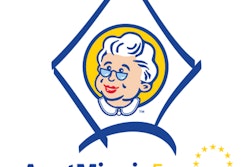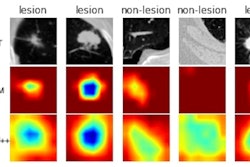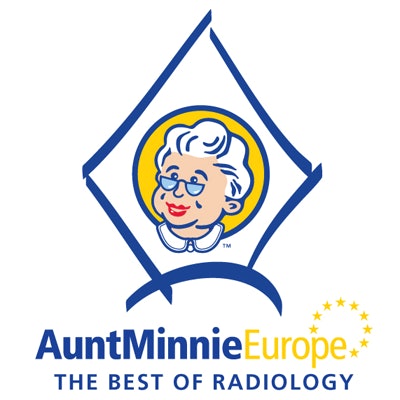
Suspense is building in the third edition of the EuroMinnies annual awards scheme from AuntMinnieEurope.com. The expert panel comprising members of our editorial advisory board, past winners, and columnists has now agreed on 16 finalists from a total of 72 semifinal candidates in eight categories. The final list is available now.
The full list of semifinalists was based on nominations submitted in late 2020 by members of AuntMinnieEurope.com. The judges then selected two finalists for each category. In the three people prizes, Germany, Ireland, the Netherlands, Spain, and the U.K. are all represented, and the gender split is 50:50.
Our panel will now choose one winner for each award. The winners will be announced in late February, and the trophy presentations will take place in March.
Most Influential Radiology Researcher
Prof. Dr. Marc Dewey, Charité, Berlin
Prof. Dr. Marc Dewey's main research interests are cardiac imaging, evidence-based radiology, and artificial intelligence. He coordinates the Pan-European randomized DISCHARGE trial comparing invasive and noninvasive coronary angiography, the COME-CCT consortium, and the Quantitative Cardiac Imaging Study Group.
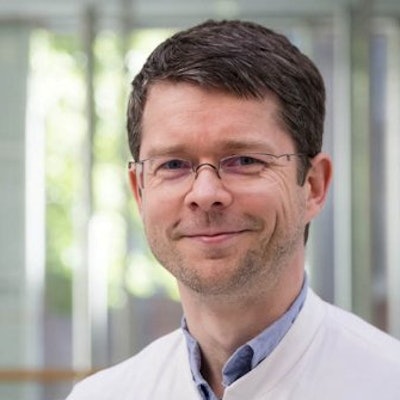 Prof. Dr. Marc Dewey.
Prof. Dr. Marc Dewey.Dewey is vice chair of the Department of Radiology at Charité -- Universitätsmedizin Berlin. He was the first radiologist to be appointed Heisenberg Professor at the German Research Foundation (DFG). The Heisenberg Program is directed primarily at outstanding researchers who meet all the requirements for appointment to a long-term professorship. It prepares them for a senior academic role.
Dewey is editor of the textbook Cardiac CT, section editor for cardiac imaging at European Radiology, and consultant to the editor of Radiology. His team has more than 220 publications with an impact factor of more than 1,500 and his h-index is 48 (more details here).
He has received the two highest scientific awards of the German Röntgen Society (DRG): the Wilhelm Conrad Röntgen Award in 2009 and the Marie Curie Ring in 2012. He was secretary of congress of the DRG in 2010 and president of the Berlin-Brandenburg Radiological Society from 2011 to 2013, when he introduced the Gustav Bucky Award to recognize a German radiologist who pioneered x-ray techniques and was forced to leave Germany in 1933.
Dewey initiated the Clinical Trials in Radiology sessions at ECR 2015 and the "My Thesis in 3 minutes" sessions together with Dr. Marc Zins in 2018. He served as chair of the European Society of Radiology (ESR) scientific program committee from 2019 to 2020, has worked as a member of the ESR e-learning editorial board, and is chair of the ESR Research Committee from 2019 to 2022, with a focus on intensifying the collaboration between subspecialties and national societies.
At ECR 2018, Dewey presented the Wilhelm Conrad Röntgen Honorary Lecture, "Value-based radiology: the future is now!". It was published as a summary in The Lancet in the same year and in full in Nature Digital Medicine in 2019.
He also led an important National Institutes of Health/German study that asked, "Is CT or MR perfusion better for diagnosing coronary artery disease (CAD)?" Recent advances in scanner technology have made the use of CT stress myocardial perfusion imaging feasible, and Dewey's team looked at just how well it matches up to MR perfusion in the diagnosis of CAD.
You can read more about his research activities on his group website.
Prof. Dr. Marion Smits, PhD, Erasmus MC -- University Medical Center Rotterdam, the Netherlands
Prof. Dr. Marion Smits is chief of neuroradiology and chair of the neuroradiology fellowship program at Erasmus MC -- University Medical Center Rotterdam. She also holds an honorary appointment at the University College London Hospitals NHS Foundation Trust in the U.K. She combines research with clinical work as a neuroradiologist and head-and-neck radiologist. She has a special interest in neuro-oncology, and collaborates at the Brain Tumour Center of the Erasmus MC Cancer Institute.
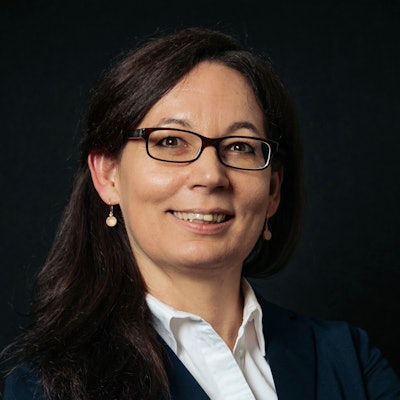 Prof. Dr. Marion Smits.
Prof. Dr. Marion Smits.She is past president of the European Society for Magnetic Resonance in Medicine and Biology (ESMRMB), chair of the Publications Committee and Executive Council member of the ESR, chair of the Dutch Society of Neuroradiology, and chair of the Brain Tumour Group Imaging Committee of the European Organisation for Research and Treatment of Cancer (EORTC).
Smits is principal investigator of Applied Physiological Neuroimaging, a research line focused on the noninvasive, in vivo visualization of the human brain's function and (micro)structure under physiological and particularly pathological conditions. She gave her inaugural lecture, "The Image that Counts," on 14 June 2019.
A driving force for her is to break down the boundaries between research and clinical practice by disseminating knowledge and insight gained from her research and by clinical implementation of physiological MR neuroimaging. She also describes herself as a strong supporter of open science, publishing her work open access and sharing research data for further use. Publication of the Erasmus MC Glioma Database (EGD), which includes imaging data as well as genetic status of over 700 glioma patients, is imminent. This database formed the basis for the largest study to date of predicting glioma genotype and grade using deep learning, according to Smits.
She was visiting professor at Johns Hopkins Medical Institution -- Department of Neuroradiology in 2015. In 2020, she was awarded honorary membership of the American Society of Neuroradiology.
You can read more about her research activities on her personal website.
Most Effective Radiology Educator
Dr. Adrian Brady, Mercy University Hospital, Cork, Ireland
Out of necessity, Dr. Adrian Brady has embraced a whole new way of teaching and learning over the past year. He has been a moderator or speaker in about 10 educational webinars since the pandemic started, as well as dozens of other online business and academic meetings.
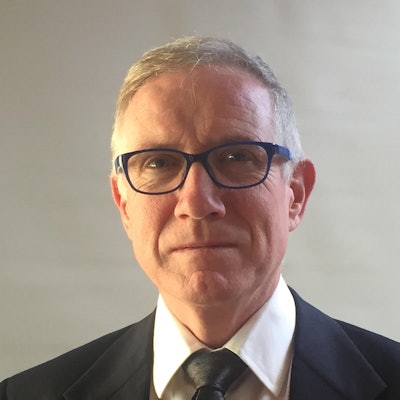 Dr. Adrian Brady.
Dr. Adrian Brady."It would be going too far to say that I like them, in that they're a very pale substitute for meeting and speaking with colleagues face-to-face," he told AuntMinnieEurope.com. "On the other hand, the use of technology has facilitated direct engagement with a much-decreased time commitment."
"We've all learned what we can do through various online platforms. I suspect that the academic future will look different, with a hybrid of online and in-person activity replacing more-traditional in-person-only meetings and courses," he added.
Brady is currently the second vice president (VP) of the European Society of Radiology (ESR), and he is due to become first VP in March 2021. He has a keen interest in quality assurance and improvement and also setting achievable workload levels as a means of minimizing errors and delivering patient safety.
He is past chair of the ESR Quality, Safety, and Standards Committee, and he is still an active member of the committee. He is closely involved in the EC-funded QuADRANT project on clinical audit, led by Dr. David Howlett. The group held a three-day online workshop on clinical audit in December 2020, and the team is continuing its work in 2021.
Brady was first author of "Radiology in the era of value-based healthcare: A multi-society expert statement from the ACR, CAR, ESR, IS3R, RANZCR, and RSNA," published by Insights into Imaging on 21 December 2020.
He has worked as a consultant radiologist at Mercy University Hospital since 1995 and as medical director of the National Hereditary Haemorrhagic Telangiectasia Centre for Ireland since 2003. He is also a clinical senior lecturer at the University College Cork School of Medicine. His clinical interests include abdominal and interventional radiology.
As Dean of the Faculty of Radiologists at the Royal College of Surgeons in Ireland from 2010 to 2012, Brady helped develop the National Quality Assurance Guidelines for Diagnostic Radiology as the first step in the introduction of a national quality improvement (QI) program. He also designed a method to measure radiologist workload in Ireland.
Dr. Luis Martí-Bonmatí, PhD, La Fe University, Valencia, Spain
Dr. Luis Martí-Bonmatí, PhD, has not chosen easy topics to focus on: computational imaging radiomics and biomarkers, image processing, imaging biobanks, and clinical innovations in medical imaging. But thanks to his work, many more people now understand and know about these complex areas.
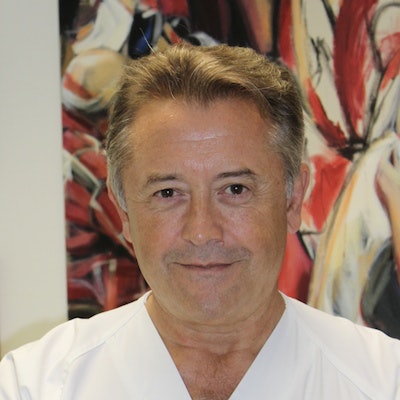 Dr. Luis Martí-Bonmatí, PhD.
Dr. Luis Martí-Bonmatí, PhD.Martí-Bonmatí is director of the Medical Imaging Clinical Unit and chairman of the radiology department and of the Biomedical Imaging Research Group at La Fe University and Polytechnic Hospital and La Fe Health Research Institute, Valencia. Since 1997, he has also been head of radiology at Quirónsalud Hospital in Valencia, integrating biomedical engineering into the radiological innovation process.
In 2011, he became professor of radiology and supervisor at the University of Valencia. He has directed over 50 doctoral theses and end-of-career projects. He is a full academic member of the Spanish Royal National Academy of Medicine and honorary member of the Royal Academy of Medicine of the Valencian Community. As a member of the Spanish National Radiology Commission, he also advises the Spanish Ministry of Health on specialty advanced education.
Martí-Bonmatí co-founded Quantitative Imaging Biomarkers in Medicine (QUIBIM), which is dedicated to artificial imaging and medical image processing, analysis, extraction, and measurement of radiomic data and imaging biomarkers to be used in clinical diagnostics, research projects, and clinical trials.
He was president of the European Society of Magnetic Resonance in Medicine and Biology from 2002 to 2004, the Spanish Society of Radiology from 2008 to 2010, the Spanish Society of Abdominal Radiology from 2000 to 2007, the European Society of Gastrointestinal and Abdominal Radiology from 2013 to 2015, and the Spanish School of Clinical Magnetic Resonance and CT from 2006 to 2012.
Martí-Bonmatí has been a member of the ESR Executive Council. As head of the Research Committee of the European Society of Radiology from 2010 to 2013, he started the Imaging Biomarkers Subcommittee. He has been a member of the ESR eHealth and Informatics Subcommittee since 2019.
He was the founder and editor of the Radiología Abdominal journal from 2004 to 2013, and associate editor of European Radiology (MRI) and Radiology (computer applications). Since 2018, he has been editor in chief of Insights into Imaging (since 2018). He is an editorial advisory board member on AuntMinnieEurope.com.
Radiology Rising Star
Dr. Samantha Fossey, Royal Sussex County Hospital, Brighton, U.K.
Dr. Samantha Fossey -- or Sam, as she is generally known -- became chair of the Junior Radiologist Forum (JRF) of the Royal College of Radiologists (RCR) in spring 2020, and she has worked on behalf of trainees nationally throughout the pandemic. She led the executive team in delivering a survey evaluating U.K. trainees' experiences.
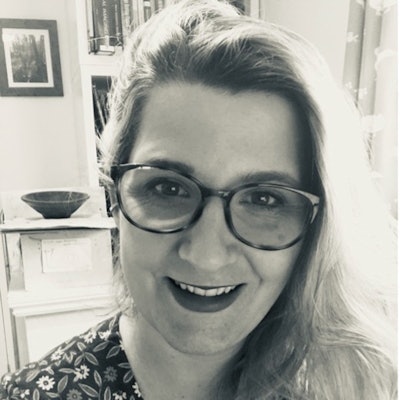 Dr. Samantha Fossey.
Dr. Samantha Fossey.In her role as the less-than-full-time (LTFT) representative of the JRF, she has conducted a survey about changes affecting trainees over the past decade. She has attended several meetings and spoken up to increase awareness of issues experienced by LTFT colleagues and to promote flexibility in training to foster sustainability.
She coordinated a collaborative project in developing a supported return toolkit to facilitate return to training after a period away from training. Along with Dr. Kate Hawtin (RCR LTFT training and working advisor), she adapted the kit for use during the pandemic to be used by redeployed and/or shielding trainees. Fossey initiated and coordinated the project and contextualized the forms and guidance to the new radiology curriculum, while Hawtin developed supported return to training resources for radiologists in London.
Having taken time out of training herself, Fossey says she is always keen to support those who are returning after a period away and enjoys giving advice or support to any trainee.
At last September's virtual meeting of the Association for Medical Education in Europe (AMEE), she was the first author of a poster about modernizing the U.K. radiology training curriculum. She has perfomed qualitative research in the form of focus groups and interviews that explored what is required of a National Health Service (NHS) radiologist to inform the curriculum rewrite.
"This research formed my master's dissertation for which I received distinction," noted Fossey, who is currently in her fourth year of radiology training and is working as a clinical radiology registrar. "My work continues in the form of being our local curriculum champion, which involves facilitating implementation of the new curriculum within my training scheme."
She is also a committee member of the RCR's Undergraduate Steering Group, which designs and delivers national undergraduate day and careers resources. She is currently using her experience in curriculum design to modernize the undergraduate curriculum to map to new U.K. undergraduate training policy/assessment.
"I am passionate about radiologists being involved in undergraduate education," she said. "At a locoregional level I work closely with my mentor in imaging education and am involved in delivering lectures, objective structured clinical examination (OSCE) examinations, careers fair and careers mentorship."
Dr. Merel Huisman, PhD, Utrecht, the Netherlands
Dr. Merel Huisman is currently a final-year radiology resident at University Medical Center Utrecht with a subspecialty interest in cardiothoracic, musculoskeletal imaging, and artificial intelligence (AI). Since August 2018, she has also been chief radiology resident at Meander Medical Center in Amersfoort. Being an epidemiologist by training, she says her passion is the intersection between AI and clinical epidemiology.
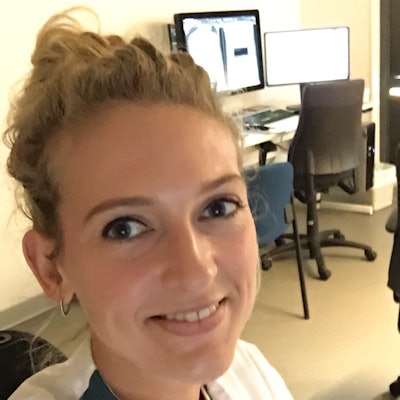 Dr. Merel Huisman.
Dr. Merel Huisman.She undertook a PhD in medical imaging at Utrecht University between December 2010 and December 2014. The title of her thesis was "MR-high-intensity focused ultrasound (HIFU) for treatment of painful bone metastases." Her main lecturer was Prof. Dr. M.A.A.J. van den Bosch. Huisman also completed a Master of Science degree with honors in clinical epidemiology during this time.
Between May and October 2014, she was junior research fellow at the UT Southwestern Medical Center in Dallas, Texas, U.S. She received the Young Investigator Award at an international symposium on focused ultrasound in Charlottesville, Virginia.
Huisman has been a board member of the European Society of Medical Imaging Informatics (EuSoMII) since October 2019, and she is chair and founder of the EuSoMII Young Club. She conducted an online survey to determine factors influencing adoption of AI in radiology in radiologists and radiology residents. The results were presented at ECR 2020, and European Radiology has accepted two papers about the survey.
When Dutch Finance Minister Wopke Hoekstra made some controversial comments about AI replacing radiologists, Huisman joined the debate by writing a guest editorial for AuntMinnieEurope.com.
"We (radiologists) will never be 'mostly unnecessary' ... While the performance of computers has dramatically improved, so far automated tasks concern very well defined, specific questions that represent only part of the complete clinical picture," she declared. "Problem-solving using contextual information is a task that is very hard for computers but comes naturally to humans. The latter is what takes advantage of human interaction, and it requires medical experience and is a growing part of modern, innovative medicine."
In December 2020, she became a trainee member of the editorial board of Radiology: Artificial Intelligence as well as a reviewer on the imaging informatics subcommittee for ECR 2022. In January 2021, she became a junior board member of the Thoracic Radiology Section of the Dutch Society of Radiology (NVvR). She gave an invited lecture at NVvR 2020 on "AI in radiology: Reality or future," and also spoke on AI in radiology at the National Institute for Public Health and the Environment (RIVM) 2020 meeting. She was also joint first author of an article in Radiology about a COVID-19 prediction model.
Most Significant News Event in European Radiology
Discussion in the Netherlands over AI replacing radiologists
Dutch radiologists have a reputation for being a relatively calm and balanced group of people who don't get excited easily, but they reacted with considerable strength and anger last autumn when a senior politician, Finance Minister Wopke Hoekstra, made controversial comments in a Parliamentary debate about how artificial intelligence (AI) is going to replace radiologists.
"The work of the radiologist to a significant extent has become redundant, because ... a machine can read the images better than humans who studied 10 years for it," said Hoekstra, who also noted that the same changes were occurring with supermarket checkout staff.
He antagonized radiologists further by referring to them as "mensen," or humans, instead of physicians or medical specialists. Also, in the speech, Hoekstra appeared to mix up his facts about the length of radiological training in the Netherlands, even though his partner, Dr. Liselot Hoornweg, is a general practitioner.
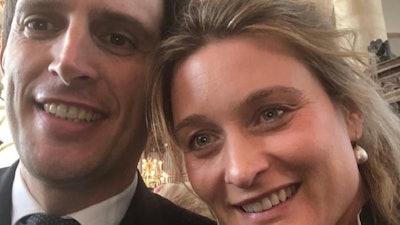 Wopke Hoekstra and Dr. Liselot Hoornweg. Photo courtesy of sterrenoptv.nl.
Wopke Hoekstra and Dr. Liselot Hoornweg. Photo courtesy of sterrenoptv.nl.The Dutch Society of Radiology, the NVvR, responded with a letter and an invitation to Hoekstra for a face-to-face meeting about radiology and its "tradition of groundbreaking innovations." The board said it wanted to discuss how radiologists "can further contribute to keeping healthcare affordable and even more effective in the future."
The society's president, Prof. Dr. Mathias Prokop, PhD, provided a translation of the main extracts.
"The demand for imaging techniques has skyrocketed over the past 20 years without the number of radiologists increasing to the same extent," stated the NVvR letter. "The latest wave of innovations does indeed relate to AI, which will eventually help us automate many tasks and make healthcare even more effective."
In the field of AI in radiology, the Netherlands is one of the leading nations, with strong academic groups and an increasing number of startup companies, the NVvR continued. However, developments in the field of AI are "stagnating because the availability of data for training of these systems is being hampered by current laws and regulations and fragmentation across different hospitals and data systems."
AuntMinnieEurope.com's news report posted on 13 October reflected the intense debate that was sparked by Hoekstra's comments. This was one of our top 10 articles in 2020.
ECR 2020 moves fully online for first time
Will ECR go ahead? Will it be called off? These were the questions being asked constantly by the European medical imaging community throughout the second half of February, when the COVID-19 outbreak was revealed in Northern Italy. The wait for news was tantalizing.
The chain of events that followed was dramatic. The ESR postponed the congress on 3 March (eight days before it was due to begin) and rescheduled it to 15-19 July. The ESR even considered taking legal action against the City of Vienna and the Republic of Austria due to the authorities' alleged failure to provide clear guidance and direction over whether to call off ECR 2020, as revealed in our news report on 10 March.
After much deliberation, ESR announced on 9 April that the congress would be held online-only, not onsite.
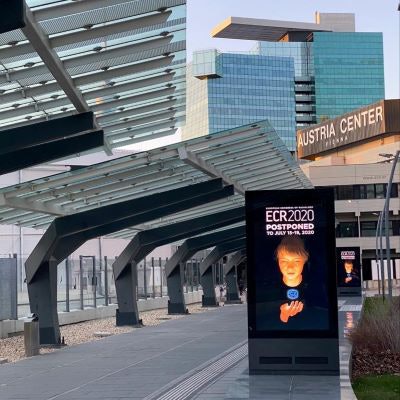 The doors of the Austria Center remained firmly shut in March 2020. The venue is currently being used as a rapid testing facility for Vienna. Photo courtesy of Dr. Erik Ranschaert, PhD.
The doors of the Austria Center remained firmly shut in March 2020. The venue is currently being used as a rapid testing facility for Vienna. Photo courtesy of Dr. Erik Ranschaert, PhD."It is with a heavy heart and much regret that the Board of Directors of the ESR has decided not to hold an onsite ECR in 2020," the ESR statement noted. "We have a social responsibility to our members, partners, staff, and the general public. In the current crisis, the ESR must lead by example, and it is clear that your safety will always be our No. 1 priority and we sincerely hope for your understanding and support of our decision."
The decision was not taken easily, and the choice not to hold ECR 2020 onsite presents a significant burden for the ESR that will also influence future congresses and endeavors, the statement continued.
"Public health authorities in Austria, as well as much of the rest of the world, have restricted large meetings and enforced travel bans, with no official indication as to when these restrictions will be lifted. As we are currently witnessing, almost all specialty and subspecialty societies and other congress organizers have already, or will shortly, cancel their meetings for 2020," the ESR stated.
The pandemic has had an effect on every aspect of life across the globe during the past year, but its impact has been felt particularly acutely by conference organizers such as ECR and RSNA. Huge uncertainty still surrounds the future of congresses, and the prospects of any large face-to-face meetings taking place in 2021 are rapidly diminishing.





